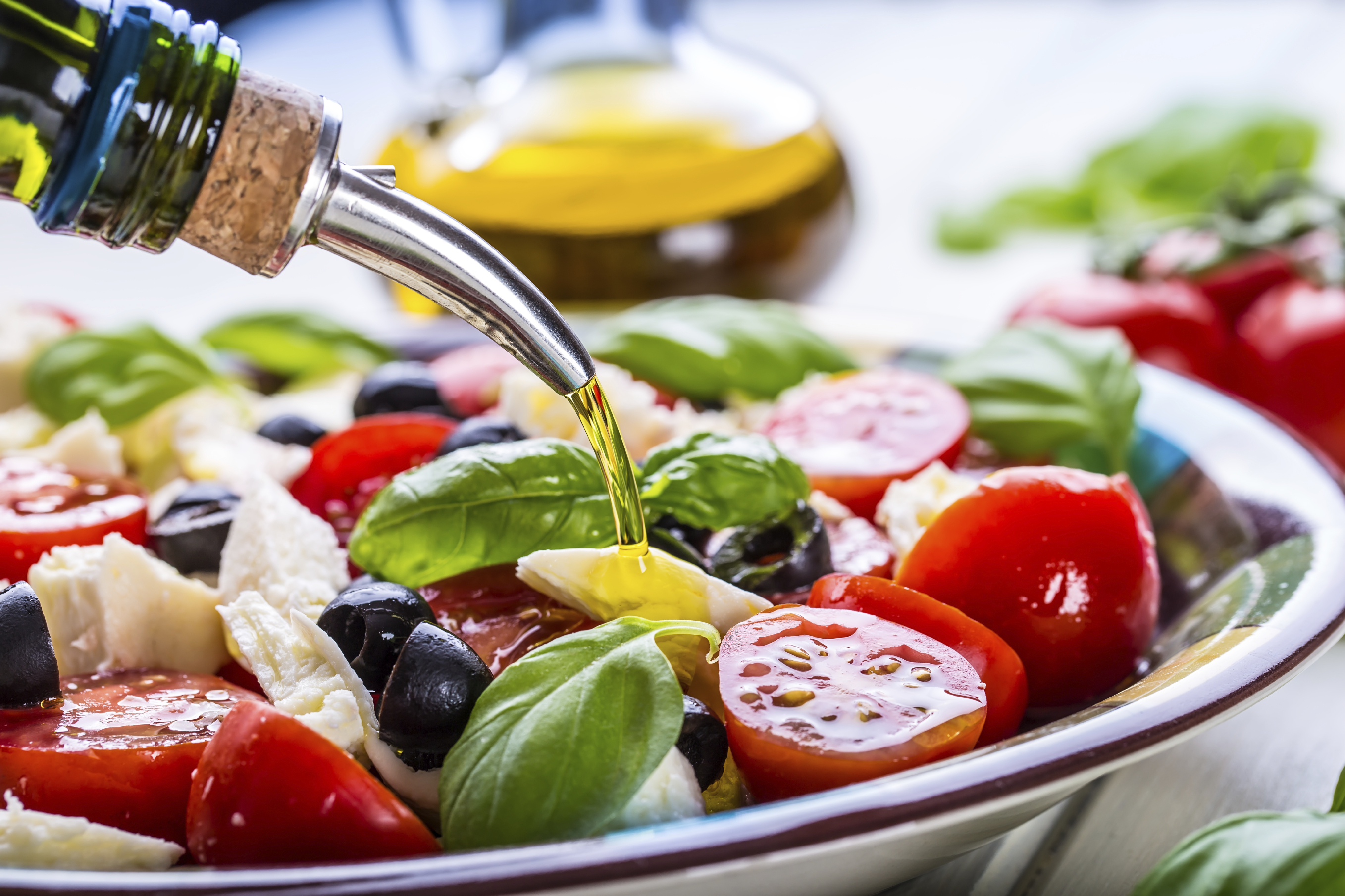What’s the Mediterranean Diet?
Have you been considering starting a heart-healthy diet? One without so many restrictions as is typical of other diets? One you can easily keep up with and be assured of sustainable weight loss? Then the Mediterranean diet may just be perfect for you. This diet is linked to a reduced risk of health challenges such as heart disease, cancer, Parkinson’s disease, Alzheimer’s disease, and bad cholesterol (LDL), to mention a few. The Mediterranean diet entails eating primarily plant-based foods such as whole grains, fruits, vegetables, legumes, nuts, olive oil, canola oil, herbs, and spices. While this diet isn’t entirely about healthy diet, it does require that you work out. In actual fact, the Mediterranean diet is more of a lifestyle than just a diet.
On the Mediterranean diet, you eat less saturated fats and hydrogenated oils (trans fats), hence reducing the risk of heart disease. Olive oil is the primary source of fat in the Mediterranean diet, and this is healthy because it provides monounsaturated fat which reduces bad cholesterol levels. Fishes like herring, lake trout, mackerel, sardines, and salmon all provide omega-3 fatty acids; these are the kind of foods you will find on some of the foods on the Mediterranean diet. Don’t you just sense some super health benefits coming your way already?
Foods in the Mediterranean Diet
There aren’t many restrictions on the Mediterranean diet. The major difference between foods you can eat on this diet and those of other diets is the frequency of consumption and the quantity you consume.
Fruits
Fresh fruits will enrich you with vitamins, antioxidants, and fiber. Eat lots of them.
Olive Oil
Olive oil is rich in monounsaturated fatty acids. You may flavor salads, chicken, and fish with olive oil to enjoy its nutrients.
Vegetables
You are advised to eat at least three servings of vegetables daily while on the Mediterranean diet.
Whole Grains
Eat quinoa, barley, oatmeal, and other grains that are not refined.

Nuts
Whether cashew nuts, almonds, or pistachios, nuts are rich in potassium, fiber, and minerals. Do you plan to get on the Mediterranean diet? Get ready to snack on nuts often.
Tomatoes
Tomatoes protect skin cells and prevent skin cancer.
Fish
Fish is a reliable source of protein on the Mediterranean diet. Eat lots of fatty fish, because they are rich in omega-3 fatty acids.
Wine
Wine is okay on the Mediterranean diet, however, you should drink in moderation. Resveratrol in red wine hinders the growth of acne-causing bacteria. Women on the Mediterranean diet are advised to have a maximum of a three-ounce serving, and men, a five-ounce serving per day, maximum.
Health Benefits of the Mediterranean Diet
It reduces the risk of type-2 diabetes
Studies show that the Mediterranean diet reduces the risk of type-2 diabetes, and it is suitable for people who trying to reduce their blood sugar levels. This diet focuses on eating foods that are rich in fiber and monounsaturated fats. This explains why it lowers blood sugar and cholesterol.
It’s great for the heart
Have you realized that there are fewer cases of heart diseases in Mediterranean countries? The reason isn’t far-fetched; it’s their diet choices that make the difference. The Mediterranean diet keeps your heart healthy.
It improves agility
The Mediterranean diet reduces the risk of muscle weakness and other aging issues. Do you plan on maintaining an active lifestyle, no matter how old you get? Then you should consider the Mediterranean diet.
It protects cognitive health
The Mediterranean diet may reduce your risk of Alzheimer’s disease, dementia, and Parkinson’s disease. People who are on the Mediterranean diet usually enjoy apt concentration and enhanced memory.
It can boost your mood
Mental health challenges such as ADHD, anxiety, and depression can be treated with the Mediterranean diet. Foods in this diet help the body produce dopamine, hence it is a way to enhance mood.
It combats inflammation
The high concentration of antioxidants in Mediterranean diet foods help combat inflammation.
It reduces the risk of dementia and Alzheimer’s disease
Due to the reduction of blood sugar and cholesterol levels, the Mediterranean diet offers a great way to reduce the risk of dementia and Alzheimer’s disease.
It reduces the risk of Parkinson’s disease
The antioxidants you get from foods in the Mediterranean diet help reduce the risk of having Parkinson’s disease by 50%. These antioxidants protect the cells from experiencing oxidative stress — a major cause of Parkinson’s disease.
It helps you lose weight

It’s not uncommon to find people start a diet, lose some weight, then they find it difficult to keep up with the diet, and sadly, the weight returns. The Mediterranean diet is different because it’s easier to sustain.
To get some encouraging weight loss results with the Mediterranean diet, you may need to follow it through for at least six months. Be careful with your portions of carbs, so you don’t ruin your weight loss plan.
It mat prevent cancer
The Mediterranean diet may help prevent the development of postmenopausal breast cancer.
It beautifies the skin
The Mediterranean diet encourages a large consumption of olive oil, and this enriches the body with vitamin E and antioxidants that hydrate and nourish the skin.
The Mediterranean diet aids pain relief
Foods you eat in the Mediterranean diet reduce inflammation and relieve stress. This goes a long way in reducing pain. Also, eating foods rich in magnesium helps you enjoy this pain-relieving quality. Eat your nuts, fish, seeds, beans, whole grains, lentils, and dark chocolate.
It improves fertility
Over the years, studies have discovered that women who eat more whole grains, fish, fruits, and vegetables rarely experienced infertility. This proves that being on the Mediterranean diet is advantageous for women who intend to have children.
Debunking 12 Mediterranean Diet Myths
The Mediterranean diet is not sustainable
The Mediterranean diet is more of a lifestyle than a diet, which makes it sustainable. People actually live on this diet all their life. The Mediterranean is relatively easy to follow because it does not have many restrictions.
The Mediterranean diet is one of the new diets
The Mediterranean diet has existed as early as the 1940s. It was popular for the reduced risk of heart disease that it offered. Its popularity grew, and nutritionists discovered that it has more benefits than people who practiced it back in the day knew. So, no, it’s not one of the newly introduced weight loss diets.
Mediterranean diet foods are scarce
The Mediterranean diet comprises everyday foods that you can easily find. A major difference between the Mediterranean diet and other weight loss diets is the quantity you eat and frequency. You’re allowed to eat a wide range of foods, however, you should eat some more frequently than others. For instance, you should eat plant foods such as grains, beans, vegetables and nuts more than sweets and meats.
Everyone who lives in the Mediterranean is healthy
Not all countries in the Mediterranean regions practice this eating habit. Remember that the Mediterranean regions include Greece, Turkey, France, Africa, Italy, and Morocco, to mention a few. Some residents of Northern Italy would use lard and butter to cook, instead of olive oil, as the Mediterranean diet recommends. Lard and butter contains a lot of saturated fats.
You can eat as much cheese as you desire
Excessive consumption of cheese gives you more calories and unsaturated fats. And of course, you don’t need these. So no, you can’t eat as much cheese as you desire.
It’s okay to drink a lot of wine
Inasmuch as wine is good for the heart, we can’t rule out the importance of moderation. You should drink wine only a few times a week on the Mediterranean diet.
You can eat desserts all the time and lose weight
You need to be cautious of dessert consumption on the Mediterranean diet. A large intake of desserts is not healthy for your midsection and weight generally. Invest more in whole grains, vegetables, fruits, and legumes.
Even when you eat desserts, you should consider eating low-calorie cookies.
It’s okay to eat large bowls of pasta and bread
Ideally, pasta, in the Mediterranean diet, should be a side dish with about 1/2-cup to 1-cup serving size. And when you eat bread, just a slice is okay.
You don’t have to hit the gym on the Mediterranean diet
People say this because people who practiced the Mediterranean diet back in the day didn’t hit the gym but were healthy. But before we compare, we should remember that they had a more active lifestyle than we do today. So by all means, exercise cannot be ruled out. Exercise daily on the Mediterranean diet.
The Mediterranean diet is only about healthy food intake
A healthy way of eating is a major part of the Mediterranean lifestyle, however, that’s not all to it. Stress management, rest, exercise, and physical activities are all part of it.
The Mediterranean diet doesn’t work outside the Mediterranean regions
The Mediterranean diet works anywhere, and for anyone. Also, the foods on the diet can be found in different parts of the world.
The Mediterranean diet is high in fat
The fats you consume on the Mediterranean diet are heart-healthy. Nuts, fish, and olive oil contain monounsaturated and polyunsaturated fats that are great for the heart. Studies show that the issue with fat is not so much about quantity, but the type of fat you consume. However, this does not rule out the fact that moderation is key.
Mediterranean Diet FAQs
Why is the diet called “Mediterranean”?
It is called “Mediterranean” because it is a way of eating in regions that surround the Mediterranean Sea. These are countries such as Italy, France, Spain, Syria, Morocco, Egypt, Lebanon, Libya, Greece, Albania, Turkey, Algeria, Malta, Tunisia, and Croatia.
Is the Mediterranean diet really easy to follow?
Relatively, it actually is. All you need to do is to simply choose healthy foods such as peanuts, avocados, olive oil, and fish. Also, you should eat lean proteins such as poultry and beans, and drink wine and yogurt in moderation.
Can I eat carbs on the Mediterranean diet?
It’s not strange that there is so much obsession with carbs. A number of people have the impression that carbs are totally unhealthy, but this is not true. There are simple carbs and complex carbs. The challenge comes when you consume these complex, highly processed carbs in high proportion. So no, carbs aren’t bad for you on the Mediterranean diet; just note that portion control is key.
Can I eat meat on the Mediterranean diet?
Yes, however, in moderation. It’s okay to eat meat only a few times a month. Also, be sure you’re buying healthy meat.
What makes the Mediterranean diet important?
The Mediterranean diet, beyond being a diet, is a lifestyle which has loads of benefits such as reduced risk of diabetes, cancer, Alzheimer’s disease, Parkinson’s disease, obesity, heart diseases, and many other health challenges.
Can I drink coffee on the Mediterranean diet?

Yes, you may have some coffee on the Mediterranean diet. In fact, the counties around the Mediterranean Sea are obsessed with coffee. The only thing here is that like carbs, you also have to be careful about how much coffee you drink. Moderation is key.
Is it okay to have smoothies on the Mediterranean diet?
Some fruits have a lot of sugar, and this may not work well for you if you are trying to lose weight. Consuming some vegetables as you have smoothies is a great idea.
Is it true that the Mediterranean diet is only for the rich?
Different studies on the Mediterranean diet show that people with higher educational qualifications and higher income tend to have more obvious improvements while on the Mediterranean diet. They had lower risks of cardiovascular disease, lost more weight, and enjoyed other benefits.
However, people with lower education level and lower income had less obvious results. So what’s the reason for these differences in results that come with varying socioeconomic statuses? It is most likely because people of higher socioeconomic status, due to more information and income, have healthier eating behaviors. Regular consumption of foods that are relatively high in polyphenols and antioxidants yield more results than others.
The Mediterranean diet actually works for the rich and otherwise, the same way it works for the highly educated and those who aren’t. What makes the difference is the ability to afford healthy foods and access information on what these foods actually are.
Now that you know…
Don’t you just feel like you’ve found the perfect diet? There aren’t many restrictions in this diet as you’d find in some others — this gives you some assurance of sustainability, and sustainability results in the attainment of your goals — weight loss, cholesterol control, heart health, and much more.




